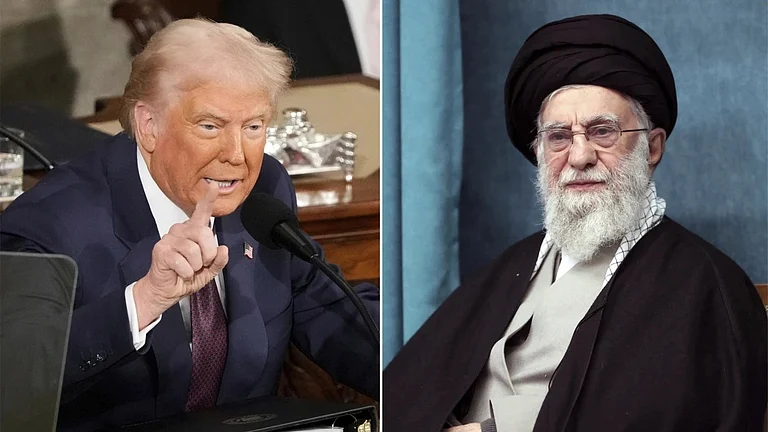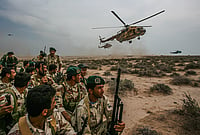"Hey! Take your hands off me! Not you! You!!!"
-- the voice of a young woman in the darkened cinema. Anold joke.
"Hey! Take your hands off Tibet!" the international chorus iscrying out, "But not from Chechnya! Not from the Basque homeland! Andcertainly not from Palestine!" And that is not a joke.
LIKE EVERYBODY else, I support the right of the Tibetan people toindependence, or at least autonomy. Like everybody else, I condemn the actionsof the Chinese government there. But unlike everybody else, I am not ready tojoin in the demonstrations.
Why? Because I have an uneasy feeling that somebody is washing my brain, thatwhat is going on is an exercise in hypocrisy.
I don't mind a bit of manipulation. After all, it is not by accident that theriots started in Tibet on the eve of the Olympic Games in Beijing. That'salright. A people fighting for their freedom have the right to use anyopportunity that presents itself to further their struggle.
I support the Tibetans in spite of it being obvious that the Americans areexploiting the struggle for their own purposes. Clearly, the CIA has planned andorganized the riots, and the American media are leading the world-wide campaign.It is a part of the hidden struggle between the US, the reigning super-power,and China, the rising super-power - a new version of the "Great Game"that was played in central Asia in the 19th century by the British Empire andRussia. Tibet is a token in this game.
I am even ready to ignore the fact that the gentle Tibetans have carried outa murderous pogrom against innocent Chinese, killing women and men and burninghomes and shops. Such detestable excesses do happen during a liberationstruggle.
No, what is really bugging me is the hypocrisy of the world media. They stormand thunder about Tibet. In thousands of editorials and talk-shows they heapcurses and invective on the evil China. It seems as if the Tibetans are the onlypeople on earth whose right to independence is being denied by brutal force,that if only Beijing would take its dirty hands off the saffron-robed monks,everything would be alright in this, the best of all possible worlds.
THERE IS no doubt that the Tibetan people are entitled to rule their owncountry, to nurture their unique culture, to promote their religiousinstitutions and to prevent foreign settlers from submerging them.
But are not the Kurds in Turkey, Iraq, Iran and Syria entitled to the same?The inhabitants of Western Sahara, whose territory is occupied by Morocco? TheBasques in Spain? The Corsicans off the coast of France? And the list is long.
Why do the world's media adopt one independence struggle, but often cynicallyignore another independence struggle? What makes the blood of one Tibetan redderthan the blood of a thousand Africans in East Congo?
Again and again I try to find a satisfactory answer to this enigma. In vain.
Immanuel Kant demanded of us: "Act as if the principle by which you actwere about to be turned into a universal law of nature." (Being a Germanphilosopher, he expressed it in much more convoluted language.) Does theattitude towards the Tibetan problem conform to this rule? Does it reflect ourattitude towards the struggle for independence of all other oppressed peoples?
Not at all.
WHAT, THEN, causes the international media to discriminate between thevarious liberation struggles that are going on throughout the world?
Here are some of the relevant considerations:
- Do the people seeking independence have an especially exotic culture?
- Are they an attractive people, i.e. "sexy" in the view of the media?
- Is the struggle headed by a charismatic personality who is liked by the media?
- It the oppressing government disliked by the media?
- Does the oppressing government belong to the pro-American camp? This is an important factor, since the United States dominates a large part of the international media, and its news agencies and TV networks largely define the agenda and the terminology of the news coverage.
- Are economic interests involved in the conflict?
- Does the oppressed people have gifted spokespersons, who are able to attract attention and manipulate the media?
FROM THESE points of view, there is nobody like the Tibetans. They enjoyideal conditions.
Fringed by the Himalayas, they are located in one of the most beautifullandscapes on earth. For centuries, just to get there was an adventure. Theirunique religion arouses curiosity and sympathy. Its non-violence is veryattractive and elastic enough to cover even the ugliest atrocities, like therecent pogrom. The exiled leader, the Dalai Lama, is a romantic figure, a mediarock-star. The Chinese regime is hated by many - by capitalists because it is aCommunist dictatorship, by Communists because it has become capitalist. Itpromotes a crass and ugly materialism, the very opposite of the spiritualBuddhist monks, who spend their time in prayer and meditation.
When China builds a railway to the Tibetan capital over a thousandinhospitable kilometers, the West does not admire the engineering feat, but sees(quite rightly) an iron monster that brings hundreds of thousands of Han-Chinesesettlers to the occupied territory.
And of course, China is a rising power, whose economic success threatensAmerica's hegemony in the world. A large part of the ailing American economyalready belongs directly or indirectly to China. The huge American Empire issinking hopelessly into debt, and China may soon be the biggest lender. Americanmanufacturing industry is moving to China, taking millions of jobs with it.
Compared to these factors, what have the Basques, for example, to offer? Likethe Tibetans, they inhabit a contiguous territory, most of it in Spain, some ofit in France. They, too, are an ancient people with their own language andculture. But these are not exotic and do not attract special notice. No prayerwheels. No robed monks.
The Basques do not have a romantic leader, like Nelson Mandela or the DalaiLama. The Spanish state, which arose from the ruins of Franco's detesteddictatorship, enjoys great popularity around the world. Spain belongs to theEuropean Union, which is more or less in the American camp, sometimes more,sometimes less.
The armed struggle of the Basque underground is abhorred by many and isconsidered "terrorism", especially after Spain has accorded theBasques a far-reaching autonomy. In these circumstances, the Basques have nochance at all of gaining world support for independence.
The Chechnyans should have been in a better position. They, too, are aseparate people, who have for a long time been oppressed by the Czars of theRussian Empire, including Stalin and Putin. But alas, they are Muslims - and inthe Western world, Islamophobia now occupies the place that had for centuriesbeen reserved for anti-Semitism. Islam has turned into a synonym for terrorism,it is seen as a religion of blood and murder. Soon it will be revealed thatMuslims slaughter Christian children and use their blood for baking Pitta. (Inreality it is, of course, the religion of dozens of vastly different peoples,from Indonesia to Morocco and from Kosova to Zanzibar.
The US does not fear Moscow as it fears Beijing. Unlike China, Russia doesnot look like a country that could dominate the 21st century. The West has nointerest in renewing the Cold War, as it has in renewing the Crusades againstIslam. The poor Chechnyans, who have no charismatic leader or outstandingspokespersons, have been banished from the headlines. For all the world cares,Putin can hit them as much as he wants, kill thousands and obliterate wholetowns.
That does not prevent Putin from supporting the demands of Abkhazia and SouthOssetia for separation from Georgia, a country which infuriates Russia.
IF IMMANUEL KANT knew what's going on in Kosova, he would be scratching hishead.
The province demanded its independence from Serbia, and I, for one, supportedthat with all my heart. This is a separate people, with a different culture(Albanian) and its own religion (Islam). After the popular Serbian leader,Slobodan Milosevic, tried to drive them out of their country, the world rose andprovided moral and material support for their struggle for independence.
The Albanian Kosovars make up 90% of the citizens of the new state, which hasa population of two million. The other 10% are Serbs, who want no part of thenew Kosova. They want the areas they live in to be annexed to Serbia. Accordingto Kant's maxim, are they entitled to this?
I would propose a pragmatic moral principle: Every population that inhabits adefined territory and has a clear national character is entitled toindependence. A state that wants to keep such a population must see to it thatthey feel comfortable, that they receive their full rights, enjoy equality andhave an autonomy that satisfies their aspirations. In short: that they have noreason to desire separation.
That applies to the French in Canada, the Scots in Britain, the Kurds inTurkey and elsewhere, the various ethnic groups in Africa, the indigenouspeoples in Latin America, the Tamils in Sri Lanka and many others. Each has aright to choose between full equality, autonomy and independence.
THIS LEADS us, of course, to the Palestinian issue.
In the competition for the sympathy of the world media, the Palestinians areunlucky. According to all the objective standards, they have a right to fullindependence, exactly like the Tibetans. They inhabit a defined territory, theyare a specific nation, a clear border exists between them and Israel. One mustreally have a crooked mind to deny these facts.
But the Palestinians are suffering from several cruel strokes of fate: Thepeople that oppress them claim for themselves the crown of ultimate victimhood.The whole world sympathizes with the Israelis because the Jews were the victimsof the most horrific crime of the Western world. That creates a strangesituation: the oppressor is more popular than the victim. Anyone who supportsthe Palestinians is automatically suspected of anti-Semitism and Holocaustdenial.
Also, the great majority of the Palestinians are Muslims (nobody paysattention to the Palestinian Christians). Since Islam arouses fear andabhorrence in the West, the Palestinian struggle has automatically become a partof that shapeless, sinister threat, "international terrorism". Andsince the murders of Yasser Arafat and Sheik Ahmed Yassin, the Palestinians haveno particularly impressive leader - neither in Fatah nor in Hamas.
The world media are shedding tears for the Tibetan people, whose land istaken from them by Chinese settlers. Who cares about the Palestinians, whoseland is taken from them by our settlers?
In the world-wide tumult about Tibet, the Israeli spokespersons comparethemselves - strange as it sounds - to the poor Tibetans, not to the evilChinese. Many think this quite logical.
If Kant were dug up tomorrow and asked about the Palestinians, he wouldprobably answer: "Give them what you think should be given to everybody,and don't wake me up again to ask silly questions."






















